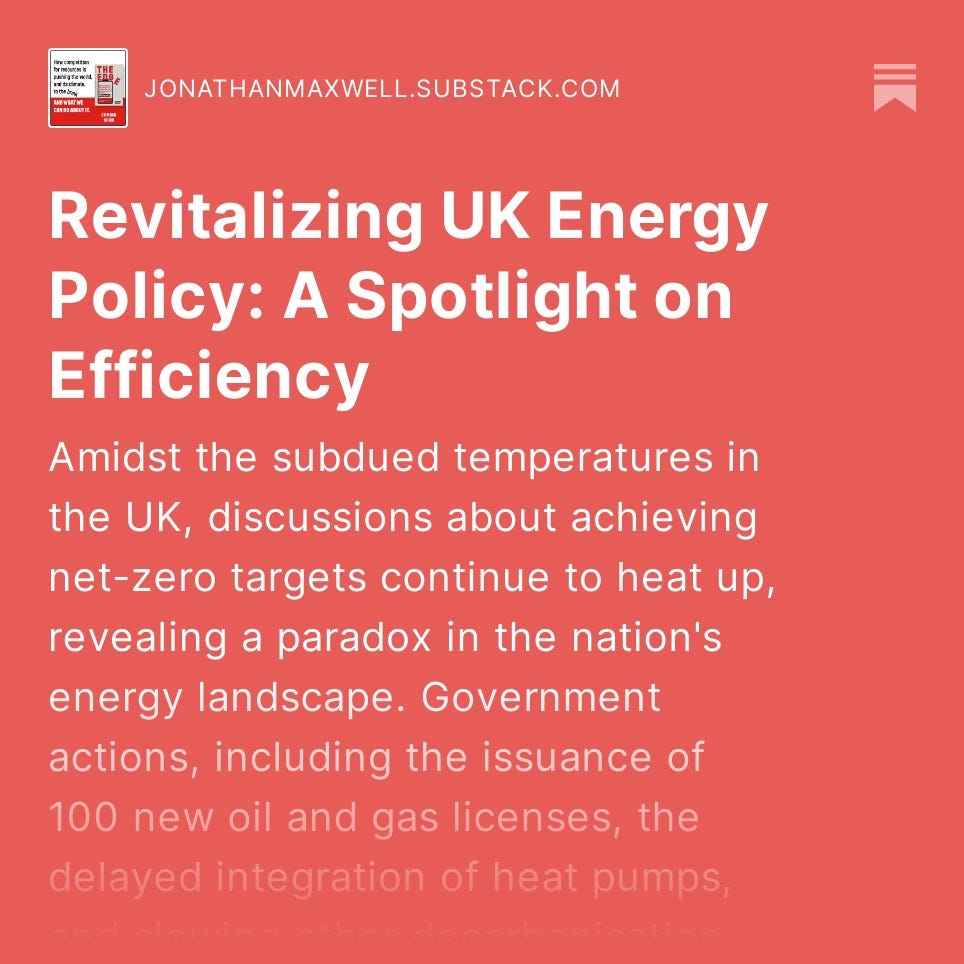Revitalising UK Energy Policy: A Spotlight on Efficiency
Amidst the subdued temperatures in the UK, discussions about achieving net-zero targets continue to heat up, revealing a paradox in the nation's energy landscape. Government actions, including the issuance of 100 new oil and gas licenses, the delayed integration of heat pumps, and slowing other decarbonisation initiatives have ignited a conversation on the nation's commitment to its environmental objectives. Yet, beneath the surface, a deeper issue simmers — a fixation on augmenting energy supply rather than systematically addressing the underlying inefficiencies in consumption, not least of fossil fuels.
This is a global problem. As Edward Lucas wrote in The Times in his column, ‘Smarter consumption is the way to net zero’, energy efficiency is the most neglected but vital part of our transition to net zero. Citing my book, ‘The Edge’, which will be released this Thursday 31st August, he points out that energy, like food and water, is in increasingly short supply, but that for all three of these, we waste most of what we are fighting over.
As fate would have it, the same month that the UK government's Energy Efficiency Task Force was set to unveil strategies for a 15% reduction in industrial energy use, the focus shifted conspicuously towards expanding fossil fuel production. This irony underscores a fundamental aspect of policy-making—a propensity to emphasise supply growth while sidestepping the root causes of energy wastage.
The core fallacy of this approach is the failure to address the inherent inefficiencies within the current energy system. Half of the energy used in gas-to-electricity conversion evaporates into space as heat, never reaching the user. Similarly, less than a third of the petrol fuelling our cars translates into actual movement, compared to over three-quarters for electricity. With energy generation often occurring remotely and reliant on fossil fuels, substantial portions of energy dissipate during extraction, conversion, generation, transmission, distribution, and eventual consumption.
Add energy security concerns, and it’s clear that it’s a critical time to shift the narrative away from a myopic emphasis on expanding energy supply and towards a holistic strategy that emphasises energy efficiency.
Here are some strategic interventions that warrant urgent attention:
1. A Call for Energy Efficiency Mandates: The government must mandate progressive annual reductions in energy consumption per unit of GDP output across public and private sectors. While the Energy Efficiency Task Force's 15% reduction target by 2030 is commendable, it pales in comparison to the swift action demanded by the European Commission, which stipulated a 15% reduction in gas use and 5% in electricity use for all member states.
2. Government Leading the Efficiency Front: Given its extensive footprint as the UK’s largest institutional energy user, the government should lead by example in its own energy consumption practices. The NHS, a significant energy consumer, is rife with energy inefficiencies. For example, less than half of its lights are energy-efficient, and fixing this problem could save £1 billion over 10 years. A comprehensive overhaul of energy supply and use across sectors like health, education, transport, and defence could unlock substantial monetary as well as carbon savings from cutting energy waste, and lead by example.
3. Pioneering Infrastructure Projects: Transformative initiatives, like decentralised energy generation for buildings, industries, and transport, coupled with waste heat recycling and the replacement of outdated lighting and HVAC systems, can deliver immense benefits and value. Government incentives, including matched funding for early-stage studies and guarantees for energy service charges and efficiency investment, could stimulate private investment in these game-changing projects.
4. Learning from Global Leaders: Drawing inspiration from nations like China and Japan, which prioritise efficiency, the UK should adopt the European Commission's "Energy Efficiency First" policy principle and emulate the USA's commitment to energy efficiency through mechanisms like the Inflation Reduction Act and Department of Energy's Loan Programme Office.
5. Encouraging Private Sector Investment: Rather than relying solely on government subsidies, the UK should capitalise on proven private sector willingness to back energy efficiency projects. By aligning incentives with tangible savings and investor benefits, a robust pipeline of projects can emerge, leading to enhanced efficiency and reduced costs.
The UK stands at an energy crossroads, poised to either continue a trajectory of wasteful consumption or to embrace an era of responsible and advantageous efficiency. In redefining and revitalising energy policy, the UK has an opportunity to curtail inflation, enhance productivity and competitiveness, and mend the current political impasse on energy.
It's time to elevate efficiency to the forefront of the national agenda. This is the cheapest, fastest, and most effective source of greenhouse gas emission reductions, energy security and a more economically sustainable future.
The Edge: How competition for resources is pushing the world, and its climate, to the brink - and what we can do about it ...'. Released on 31 August 2023, published by Nicholas Brealey Publishing, an imprint of John Murray Press, part of the Hachette Book Group





